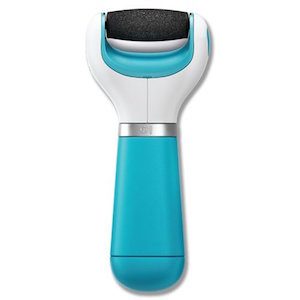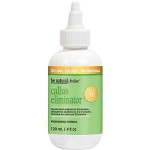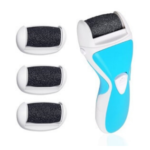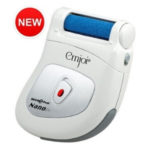Should You Use Callus Remover Products on Your Face?
When in doubt of the question,”Should You Use Callus Remover Products on Your Face?” the answer to this question is always: no. That being said, there are some exceptions to the rule, and there are some surprisingly powerful treatments that can relieve rough skin without resorting to actual callus removers. In order to understand what treatments are safe and why they can or cannot go on your face, then you have to understand what callus removers are technically designed to do.
 Understanding Calluses and Callus Removers
Understanding Calluses and Callus Removers
A callus is a thick layer of hard, dead skin. Calluses typically develop over areas that experience a lot of friction, most commonly on your feet and heels. Elbows develop calluses sometimes, too, as do knees, especially if you have to work on your knees as part of your job or as a hobby, like gardening. They’re actually your body’s response to frequent irritation. Think of calluses as armor for your skin. Many times, calluses help people perform tasks more easily and with less pain. People who frequently walk barefoot and have thick calluses protecting their feet are a great example. Unfortunately, which there is nothing necessarily wrong with calluses, they can grow to wide or thick and end up causing pain. Many people also find them unsightly. This is where callus removers come into the picture.
What Callus Removers Do to Your Face
Different products remove calluses in different ways. The oldest, and often most effective type of treatment comes from abrasive tools, such as pumice stones. Grating tools, such as metal files, also fall under this category. These tools remover layers of skin through friction. When you use a pumice stone or file, you literally scrape away your calluses a little bit at a time.
Chemical callus removers are just as popular as abrasive treatments. These come in many shapes and forms, including peels and gel treatments. Some of these options remove calluses by triggering a slough, which causes dead skin to lose its bond with living tissue and just fall off. Other chemical treatments dissolve or burn away skin. Both types of treatments rely on very strong chemicals that must always be used with caution.
A third form of callus treatment aims to soften calluses. These kinds of treatment usually come as moisturizing creams and lotions. Applying them to a callus for a period of time helps the skin both soften and loosen. These treatments often pair well with pumice stones and files, because them make it easier to rub away the thick, hard callus. Many lotion and cream treatments also help keep calluses away in the future through regular application to trouble spots.
Safety Hazards
Your face has very delicate skin. It’s easy to do serious damage to this tissue, and the results are terribly visible after the fact. More importantly, your eyes are part of your face. Your eyes are your most sensitive sensory organs. Eye injuries may cause permanent vision problems or even blindness. No callus treatment is worth that risk. Using chemicals near your mouth and nose also increase the likelihood that you’ll inhale part of the product. These chemical fumes may not be safe to breathe. If a product is designed to be used on your feet, then there’s no reason for the manufacturers to worry about the chance of inhalation. What’s safe for one part of your body could be toxic to another.
Treating Calluses on Your Face
Although it’s rare to get actual calluses on your face, it is technically possible. To treat these patches of rough skin, however, you need to choose the right product very, very carefully. Your appearance, sight, and respiratory health are on the line. We’ll review how to determine if an actual callus remover is safe and where you can find alternative treatments to soften the skin of your face.
How to Tell if a Callus Remover Is Safe
The more you know about how a product works, the better. Whenever you consider a product, first check the label to see which parts of the body the treatment is approved for. Most will only be approved for feet and body, not face. Remember, when in doubt about whether or not a product is safe for your face, don’t use it. Contact the manufacturer if you need more information and do your research.
Certain types of treatment are safer than others. By far the safest options are pumice stones. They don’t remove skin as quickly as a file, and they don’t bring potentially dangerous chemicals near your eyes, nose, and mouth. You also enjoy a lot of control when using a pumice stone. It’s hard to stop a chemical treatment halfway, but you can stop rubbing a pumice stone over your face whenever you choose. You won’ consciously rub your skin until your face is bleeding, but a chemical could leave burns before you can have the chance to remove it.
Alternative Facial Treatments
Keep in mind that there is an entire industry focused on skin treatments for your face. That industry is, of course, the beauty industry. It doesn’t matter whether you’re a man or a woman, these products can do wonders for your skin. They actually do a lot of the same things that callus removers do. The key difference is that they’re specifically designed to be safe for facial application. Look for strong exfoliating products. You’ll find a host of scrubs, peels, and even abrasive tools designed to remove hard, dry skin. Some work just as well as actual callus treatments. Powerful moisturizers that are safe for daily treatment can help prevent your callus from coming back in the future.
Consider the idea that the hard, dry, or irritated skin on your face isn’t actually a callus. Many medical conditions create such blemishes. Eczema and psoriasis are two of the most common. They leave thick, scabby skin on your face that often gets worse when exposed to harsh chemicals or friction. If you have persistent skin issues on any part of your body, go to see your doctor right away. They may have more effect treatments to offer than any over the counter solution.
Final Thoughts
Are callus removers safe to use on your face? It depends on the treatment and the true condition of your face. Chronic facial calluses or other irritated spots could be symptoms of a larger problem, and it’s important to see your doctor right away. If you need to treat a thick patch of hard skin, however, always remember to consider your options. Most importantly, always read the label.



